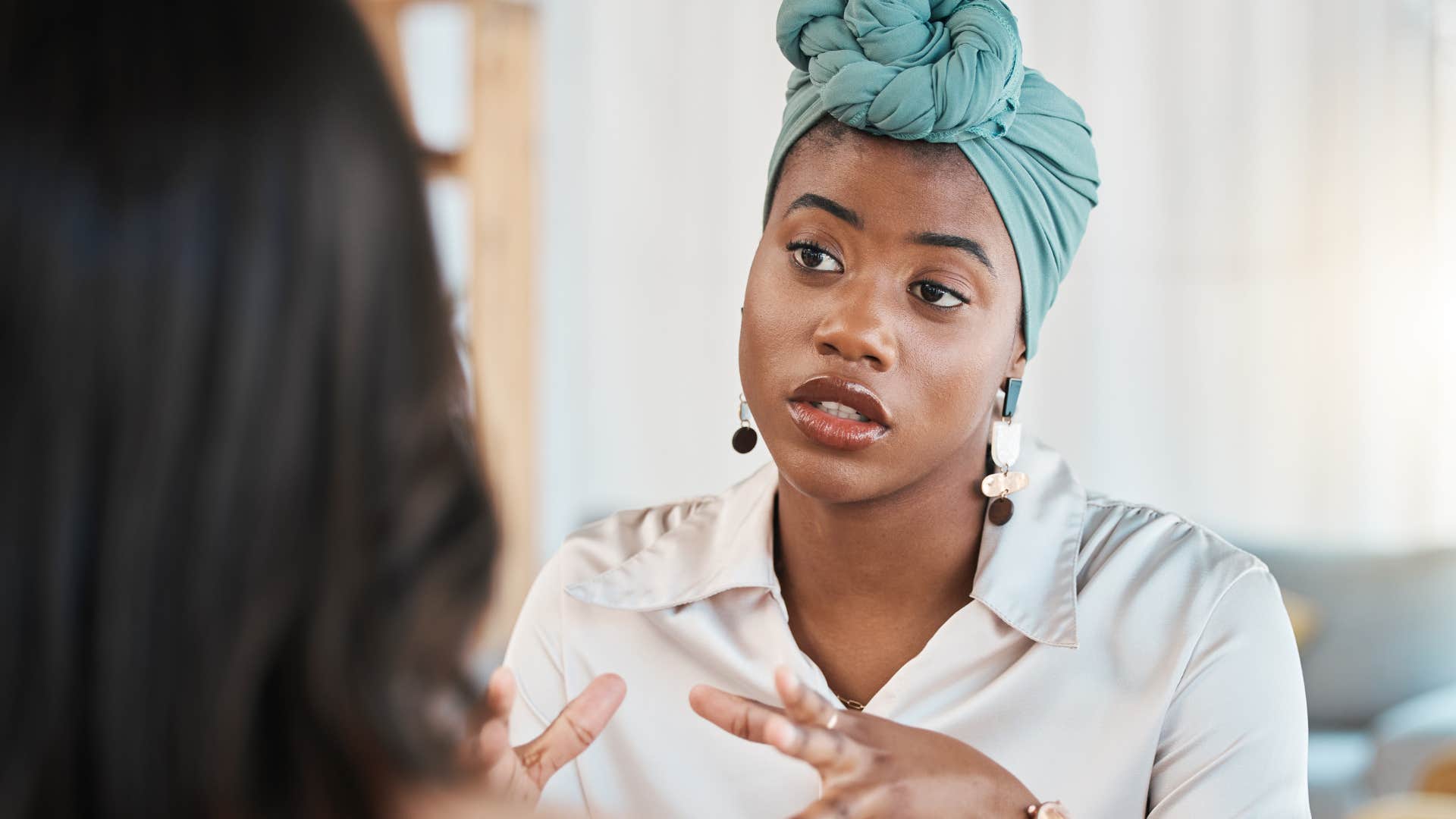11 Brilliant Ways To Say ‘It’s Your Fault’ Without Being Rude
Calling out someone's mistakes doesn't have to mean being confrontational.
 GBJSTOCK | Shutterstock.com
GBJSTOCK | Shutterstock.com Adopting an aura of defensiveness can sabotage healthy connections and mutual understanding in every aspect of your life, from your intimate relationships to your interactions at work. According to clinical psychologist Seth Meyers, feeling offended or defensive can lead to all sorts of uncomfortable feelings and behaviors — from blame-shifting to gaslighting and even being entirely avoidant — that sabotage a person’s emotional well-being and relationships with others. Because of that, it's important to recognize that there are some brilliant ways you can say "it's your fault" to someone without being rude or making them feel cornered.
By leveraging these simple tweaks to your choice of words, you'll ensure that you are able to hold someone accountable and provide meaningful feedback while cultivating feelings of comfort and safety, making the best of what would otherwise likely by uncomfortable and awkward situations.
Here are 11 brilliant ways to say ‘it’s your fault’ without being rude
1. ‘I believe there was a misstep, so let’s reassess how this was handled.’
 PeopleImages.com - Yuri A | Shutterstock.com
PeopleImages.com - Yuri A | Shutterstock.com
According to psychologist Jacquelyn Johnson, the best way to navigate conflict with a defensive person isn’t to avoid it completely, but rather to focus on yourself and your own statements. By using “I” statements, reflecting on your own emotions, and maintaining a calm, welcoming demeanor, you not only make the other person feel more comfortable, you work together — rather than compete against each other — towards a common goal.
When you’re on the same team, whether it’s with a partner, a co-worker, or a complete stranger, conflict resolution is much easier and healthier for everyone involved. While someone may not directly take accountability for their mistakes, if they’re willing to discuss them and find a new way forward, that’s all you need to resolve a situation in most scenarios.
2. ‘Thank you for your help. Let’s look at where there’s room for growth.’
 insta_photos | Shutterstock.com
insta_photos | Shutterstock.com
Rather than framing someone’s mistakes or missteps as failures, brilliant people shift their approach to encourage other people to view them as opportunities for growth. Whether they’re resolving conflict in a relationship, reflecting on an argument, or working in a professional space, many of the brilliant ways to say “it’s your fault” without being rude revolve around making people feel empowered, rather than defensive.
Empowering people into accountability often revolves around teaching — giving people the tools and resources they need to grow, even after they’ve made a mistake. If there’s envy or resentment fueling a conversation around a mistake, whether it’s an intimate relationship or a professional one, it’s inevitable that someone will feel offended or attacked.
3. ‘It seems like something went wrong. Let’s plan a new path forward.’
 Perfect Wave | Shutterstock.com
Perfect Wave | Shutterstock.com
According to a study published in the Humanities & Social Sciences Communications journal, collaborative problem-solving and conflict resolution doesn’t just help to grow trust and bonds in a relationship, it can also help an individual to build better critical thinking skills.
When we use a phrase like this to analyze other people’s mistakes without confronting them, isolating them, or sparking feelings of shame, we open the door to a conversation that’s beneficial for everyone. While competition can be motivating in certain situations, collaboration is much more productive for facilitating productive conversations and emotional stability.
4. ‘I understand your reasoning behind that decision. Let's try something new.’
 GaudiLab | Shutterstock.com
GaudiLab | Shutterstock.com
Psychology expert Isaac Prilleltensky argues that feeling valued and appreciated doesn’t only help promote better health outcomes and a more balanced emotional state, it also encourages us to build better, more fulfilling bonds with the people around us. So, even when we’re talking about a mistake or taking accountability for something that’s not perceived favorably, brilliant people can still make us feel heard and loved.
Calling out someone’s behavior or pointing out mistakes doesn’t have to feel like a negative confrontation, it can simply be a way for people to collaborate towards a better outcome and goal.
5. ‘It’s possible that our initial assumptions were incorrect.’
 Fizkes | Shutterstock.com
Fizkes | Shutterstock.com
By substituting accusatory language like “you” or “your assumptions” with a more collaborative phrase like this one, brilliant people avoid fending off unnecessary defensiveness in their problem-solving discussions. Rather than competing with one another, they collaborate, working together to define common goals and try new things.
Many of the brilliant ways to say “it’s your fault” without being rude revolve around this collaborative mentality where everyone feels importantly heard, supported, and valued in a conversation, even if they made a mistake.
6. ‘I always appreciate your input, but there are a few concerns.’
 insta_photos | Shutterstock.com
insta_photos | Shutterstock.com
Starting with something inherently positive, like a piece of encouragement or a compliment, when you’re trying to tell someone they made a mistake can help to ensure that they’re in a welcoming headspace for receiving feedback.
People with low self-esteem and insecurities often tend to struggle with receiving feedback, even if it’s constructive. Believing that all feedback is a personal attack against them, they resort to defensive behaviors like avoidance or blame-shifting to avoid confrontation in ways that can sabotage collective goals and relationships.
To combat that defensiveness, it’s important to build trust with the people you’re communicating with, ensuring that you’re leveraging all the brilliant ways to say “it’s your fault” without being rude and sabotaging your discussion.
7. ‘Can you help me understand your thought process on this?’
 Stock 4You | Shutterstock.com
Stock 4You | Shutterstock.com
Oftentimes, people make mistakes without fully understanding what they did or why they did it. By encouraging someone to take accountability for something they don’t understand, you’re not only likely to see that behavior again, but some resistance and defensiveness when you confront them with it.
By using a phrase like this that works to cultivate feelings of mutual understanding, you steer clear of the defensiveness that often sabotages healthy conversations and relationships. You’re working together to solve a problem, rather than immediately offending someone by confronting them over a mistake they made.
8. ‘We all make mistakes.’
 PeopleImages.com - Yuri A | Shutterstock.com
PeopleImages.com - Yuri A | Shutterstock.com
According to experts from Belmont University, people are more receptive to compassionate and supportive language when it’s coming from someone who they trust. For someone that already leads with empathy in their life and is incredibly self-aware, knowing how to support someone through discomfort can be easy using active listening techniques, open body language, and the right phrases.
While there are many brilliant ways to say “it’s your fault” without being rude, they all revolve around feelings of compassion, trust, and understanding. With a phrase like this, you not only point out the humanity in yourself and your own self-awareness, you make someone else's mistake feel like a rite of passage rather than a failure.
9. ‘What did you learn from this experience?’
 Fizkes | Shutterstock.com
Fizkes | Shutterstock.com
When we consider and focus on the journey, rather than the outcomes, we not only make more productive progress, we give ourselves grace when the end result isn’t what we anticipated. From setting personal goals to investing time in a relationship or struggling with a project at work, sometimes the point is to grow, not to actually realize our rigid goals or expectations.
By using a brilliant phrase like this to urge someone to reflect on their progress, helpful and empathetic people can encourage others to take accountability and relieve themselves of the emotional burden and anxiety of not reaching their goals in the ways they imagined.
10. ‘In hindsight, what do you think led us here?’
 GaudiLab | Shutterstock.com
GaudiLab | Shutterstock.com
Self-reflection is important for both emotional regulation and personal growth. While you may have to prompt this kind of reflection in others, using phrases like this or “Let’s take some space to think,” to make a conversation productive, challenging other people to consider why and how they made a decision is the best way to address it and take accountability.
While it’s often uncomfortable to come to the realization that something was “your fault,” the process of taking accountability doesn’t have to involve feelings of guilt or shame, according to Nika White Consulting. Especially in a relationship when resolving an argument with a partner, we often resort to emotional responses to cope with our guilt, but accountability can feel empowering when there’s respect and trust present.
11. ‘What did you expect to happen when making this decision?’
 EugeneEdge | Shutterstock.com
EugeneEdge | Shutterstock.com
Especially in a highly emotional or stressful conversation, many of the brilliant ways to say “it’s your fault” without being rude revolve around the right choice of body language and tone of voice. For example, this specific phrase could be taken in different ways depending on how and in what context someone uses it.
By ensuring that you’re maintaining a calm demeanor, you protect against offended other people or coming across as rude and entitled. Find ways to draw someone into the conversation, giving them space to speak about their decision making process and even clear up misunderstandings.
When people feel heard and valued, they’re more likely to trust you and believe that you have their best intentions in mind.
Zayda Slabbekoorn is a staff writer with a bachelor’s degree in social relations & policy and gender studies who focuses on psychology, relationships, self-help, and human interest stories.

